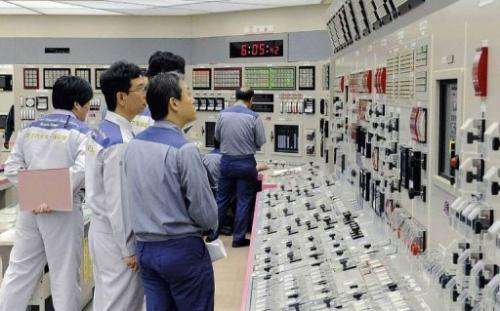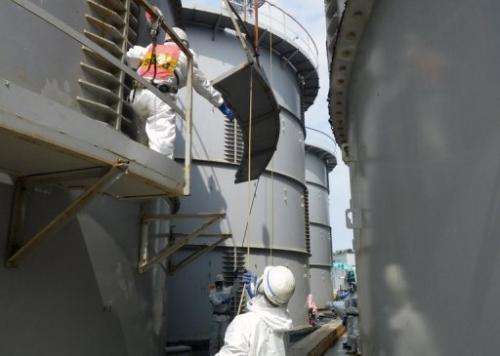Japan to be nuclear-free as last reactor switched off

Japan on Sunday began switching off its last operating nuclear reactor for an inspection, with no date scheduled for a restart amid strong public hostility towards atomic power.
The move will leave the world's third largest economy without atomic energy for the second time since the Fukushima nuclear crisis erupted in March 2011.
Nuclear power supplied about one-third of the resource-poor nation's electricity before a tsunami knocked out cooling systems and sparked meltdowns at Fukushima, causing tens of thousands to flee their homes.
Prime Minister Shinzo Abe has openly supported a return to the widespread use of atomic energy, but the public remains largely opposed on safety grounds.
Kansai Electric Power (KEPCO) Sunday started gradually to take offline the No. 4 reactor at its Oi nuclear plant in the western prefecture of Fukui.
"The work started at 4:40pm (0740 GMT)," said a company spokesman. "The reactor will come to a complete stop early tomorrow (Monday)."
Japan previously was without any nuclear energy in May 2012, when all of the country's 50 commercial reactors stopped for checkups in the wake of the disaster.
Utilities were unable immediately to restart them due to public opposition.
It was the first time in more than four decades that Japan had been without nuclear power.
Government officials and utilities voiced concern at the time that Japan could face major blackouts without nuclear power, particularly in the western region that relied heavily on nuclear energy.
Their fears proved unfounded but the government last year gave Kansai Electric approval to restart No. 3 and No. 4 reactors at the Oi plant, arguing that nuclear energy was necessary to meet increased electricity demand during the winter.

The reactors were reactivated in July 2012 and resumed full commercial operation the following month, but the No. 3 reactor was shut down earlier this month for a scheduled inspection. The nation's other reactors have remained idle.
Utilities this summer have submitted applications to restart their reactors with the Nuclear Regulation Authority, which has significantly upgraded safety standards since the Fukushima crisis.
The central government and utilities will seek the consent of local governments and communities hosting nuclear plants before any future restarts.
The No. 3 reactor at the Ikata nuclear plant in Ehime prefecture in the southwestern Shikoku region may come back online early next year, the Sankei Shimbun newspaper said.
The Asahi Shimbun meanwhile said the reactor at Ikata might resume operation in "the coming winter".
Anti-nuclear campaigner Greenpeace Japan said the country must seize the opportunity of being without nuclear power to focus on promoting renewable energy.
"Having zero running nuclear reactors is proof that we do not need nuclear plants," Junichi Sato, executive director of the environmental group in Japan, said in a statement Friday.
He urged the government not to rush to restart reactors and to focus on containing the ongoing atomic crisis at Fukushima, and helping those evacuated to avoid exposure to radiation.
"Going without nuclear energy for the second time is a major opportunity for Japan to become a leading nation for renewable energy," Sato said.
But utilities have called for the swift restart of reactors to ensure stable electricity supplies.
"In order to maintain stable supplies, we believe it is necessary for nuclear to play its role" as a key energy source, Makoto Yagi, chairman of the Federation of Electric Power Companies in Japan, said Friday.
He is also the president of Kansai Electric.
Japan has turned to expensive fossil-fuel alternatives to fill the gap left by the shutdown of atomic plants.
Utilities have raised charges to cover increased fuel costs for thermal plants.
Radiation was spread over homes and farmland in a large area of northern Japan when the massive tsunami hit Fukushima on March 11, 2011.
No one is officially recorded as having died as a direct result of the meltdowns, but tens of thousands were evacuated and many remain so.
Some areas are expected to be uninhabitable for decades.
© 2013 AFP





















